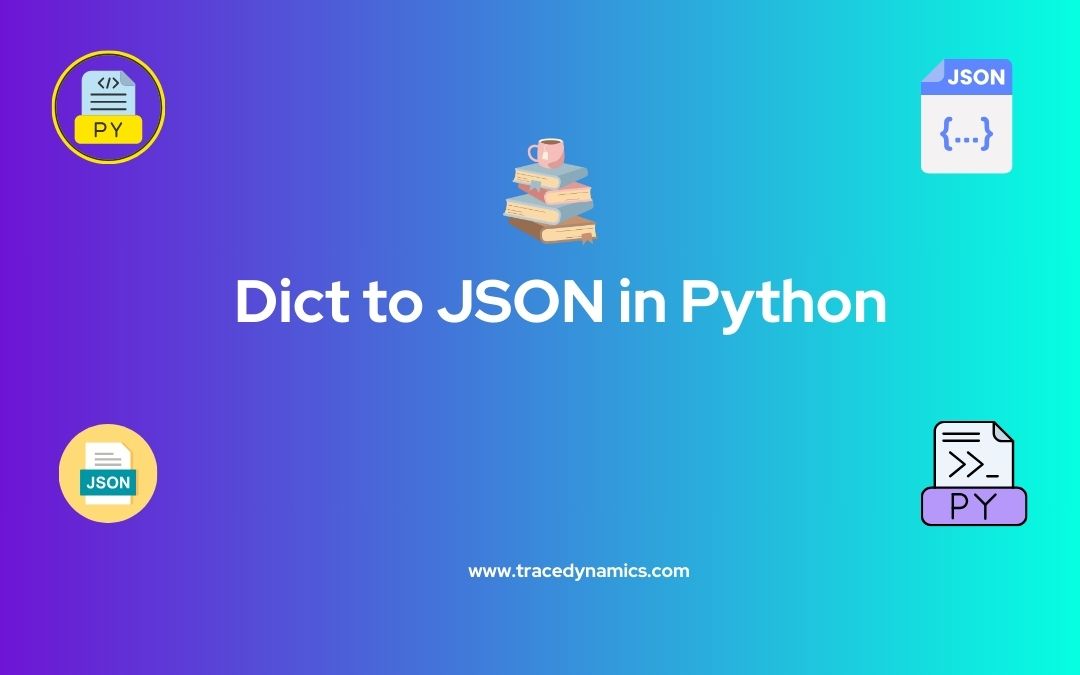Converting a Python dictionary to JSON (JavaScript Object Notation) is a fundamental task encountered in various data processing and web development scenarios. This article explores various techniques for achieving this conversion, including built-in functions, libraries, and custom methods.
Understanding the Need for Dict to JSON Conversion
Dictionaries are native data structures in Python, used for storing key-value pairs. JSON offers a lightweight and widely used format for data interchange between applications and platforms. Converting dictionaries to JSON enables efficient data serialization, transmission, and interoperability.
Built-in Functions for Dict to JSON Conversion
The Python standard library provides the json module for handling JSON data. This module offers two primary functions for dict to JSON conversion:
1. json.dumps(dict):
This function converts a Python dictionary to a JSON string. It takes the dictionary object to be converted as a single argument and, by default, sorts the dictionary keys using default separators and indentations.
Python
data = {
"name": "John",
"age": 30,
"hobbies": ["Reading", "Coding", "Music"]
}
json_string = json.dumps(data)
print(json_string)
# Output: {"name": "John", "age": 30, "hobbies": ["Reading", "Coding", "Music"]}
2. json.dump(dict, file):
This function writes the JSON representation of a dictionary directly to a file. It takes the dictionary object and the file object where the data is to be written.
Python
with open("data.json", "w") as f:
json.dump(data, f)
Advanced Techniques for Dict to JSON Conversion
1. Customizing the Output:
The json.dumps() function offers various arguments for customizing the output, such as sort_keys, indent, and separators.
Python
json_string = json.dumps(data, sort_keys=True, indent=4, separators=(",", ": "))
print(json_string)
# Output:
# {
# "age": 30,
# "hobbies": [
# "Coding",
# "Music",
# "Reading"
# ],
# "name": "John"
# }
2. Handling Complex Data Types:
Dictionaries can contain various data types, including nested dictionaries and lists. The json module automatically converts these types to their JSON equivalents, but custom handling might be needed for specific non-serializable objects.
3. Using External Libraries:
Libraries like simplejson and orjson offer alternative implementations for JSON serialization with potentially better performance and additional features.
4. Customizing Conversion with Functions:
For complex scenarios, define custom functions to handle specific aspects of the conversion process, such as applying formatting or filtering data.
Choosing the Right Technique
Choose the best approach for converting a dict to JSON in Python based on factors like data complexity, customization requirements, performance needs, and specific data handling.
Best Practices for Dict to JSON Conversion
- Use the built-in functions for simple cases.
- Customize the output format as needed.
- Handle non-serializable data types appropriately.
- Consider performance when dealing with large datasets.
- Utilize libraries for advanced features and optimization.
Conclusion
Understanding how to convert dictionaries to JSON in Python empowers you to efficiently store, transport, and exchange data across various applications and platforms. By mastering the built-in functions, advanced techniques, and best practices, you can ensure robust and flexible data processing in your Python code.
Additional Resources
Frequently Asked Questions
What is dict to JSON conversion in Python?
Dict to JSON conversion in Python involves transforming a Python dictionary into a JSON formatted string.
Why is dict to JSON conversion important?
It’s crucial for data serialization, transmission between different systems, and for working with web APIs.
What is the json.dumps() method in Python?
The json.dumps() method converts a Python dictionary to a JSON formatted string.
Can json.dumps() handle complex data structures?
Yes, json.dumps() can process nested dictionaries, lists, and standard data types in Python.
How do I write a JSON string to a file in Python?
Use json.dump() method, which writes the JSON string directly to a file.
Can I customize the JSON output format?
Yes, using json.dumps() with arguments like sort_keys, indent, and separators allows customization.
Are there external libraries for dict to JSON conversion?
Yes, libraries like simplejson and orjson offer additional functionality and performance enhancements.
How do I handle non-serializable objects in dict to JSON conversion?
For non-serializable objects, define custom serialization functions or use a library that supports their conversion.
What are the best practices for dict to JSON conversion in Python?
Use built-in functions for simplicity, customize as needed, and handle non-serializable objects appropriately.
How does dict to JSON conversion support web development?
It allows seamless data exchange between Python backend and JavaScript frontend or APIs.
Can dict to JSON conversion handle data from databases?
Yes, it’s often used to convert query results into JSON for API responses or data processing.

